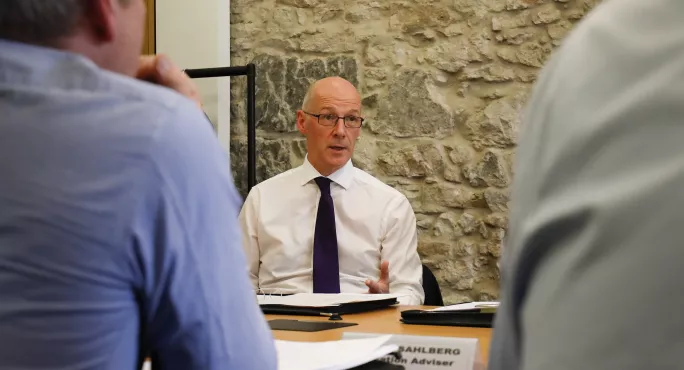- Home
- John Swinney: ‘Teachers in Scotland deserve fair pay rise’
John Swinney: ‘Teachers in Scotland deserve fair pay rise’

2019 is well underway and the Christmas break feels like a distant memory.
It might also feel like hardly any time has passed at all since I last wrote to you about pay, but given its importance I want to take this opportunity to provide an update.
We believe that teachers deserve a fair pay rise, that is what everyone is working towards.
I recognise the strength of the rejection of the previous pay offer and in order to make any new offer as attractive as possible, the Scottish government is prepared to improve its contribution around main-grade restructuring and revaluation of all other SNCT (Scottish Negotiating Committee for Teachers) pay scales. This is a clear indication of the shared commitment between Scottish government and local government to recruit and retain teachers.
I have proposed to the EIS union that teachers would receive a minimum 9 per cent increase between January 2018 and April 2019 and a further 3 per cent rise in April 2020. Any offer can only be made by local authorities as your employers, so if Cosla [councils umbrella body] agrees to this new proposal, I believe this would result in a materially improved offer which unions should put to their members. With support from teachers, it would be possible to bring discussions to a conclusion.
Outwith the issue of pay, work continues apace, in and out of the classroom, to ensure every child has the same opportunity to succeed.
We want Scotland to be the best place in the world to grow up and teachers are on the frontline when it comes to making a difference for every child across the country.
That is why we are doing everything we can to empower the profession.
Our education reforms are designed to encourage sharing of the best educational practice around the country, enabling teachers to learn from each other’s experiences. They will also give more power to head teachers to decide what works best in their classrooms and for their young people.
Headteachers will be key decision makers in their schools, with more control to lead improvements and make decisions about curriculum, staffing and budgets, backed by £750 million of investment through the attainment fund.
This includes £120 million of Pupil Equity Funding given directly to schools in 2017-18 and 2018-19, with a further £120 million in the budget for 2019-20, enabling headteachers to work with their school community to decide the best way to tackle the poverty-related attainment gap as early as possible.
Evidence from the interim evaluation of the Scottish Attainment Challenge and from the inspections of the Challenge Authorities shows that the quality of teaching and learning is one of the most important factors in raising attainment and reducing the poverty related attainment gap, and we are working with the EIS to provide funding of £250,000 over three years to develop a professional learning package for teachers and headteachers to help address the impact of poverty in the classroom.
So we continue to invest in the skills and knowledge of the teaching workforce and create new opportunities for teachers to develop their careers because it is not only beneficial to the workforce but to learners.
Outcomes for our young people are improving - a record percentage of school leavers in 2016-17, the most recent year for which we have figures, left with five or more passes at SCQF (Scottish Credit and Qualifications Framework) Level 6 or better, an increase of 7.7 percentage points, in comparison with 2009-10.
Looking at attainment when pupils leave school, the gap between most and least deprived is generally narrowing, and overall attainment is up. The proportion of 2016-17 school leavers from the most deprived areas in a positive destination nine months after leaving school increased to 87.6 per cent - reducing the gap with school leavers from the least deprived areas by 22 per cent in comparison with 2015-16.
We know that as attainment of school leavers improves, the likelihood of leavers going on to a positive destination increases.
And increases in attainment and the proportion of school leavers going on to positive outcomes is testament to the hard work, day-in and day-out, of teachers, to present a broad curriculum in a way that inspires, engages and involves all pupils.
It is not an easy task and I am sure at times it can feel like an unending one. But know that the figures show that our combined efforts are making a difference.
Providing every child with an equal opportunity to succeed, a world-class education and the best possible start in life will improve Scotland for all of us, and teachers are at the forefront of making that vision a reality.
Throughout 2019 it is important we keep this goal in our sights and build on the hard work undertaken so far. We all have a part to play, but I look forward to working together, to ensure all of Scotland’s children are able to thrive.
John Swinney is Scotland’s education secretary and deputy first minister. Today, we have also published a piece on teacher pay by EIS union general secretary Larry Flanagan.
Keep reading for just £1 per month
You've reached your limit of free articles this month. Subscribe for £1 per month for three months and get:
- Unlimited access to all Tes magazine content
- Exclusive subscriber-only stories
- Award-winning email newsletters



